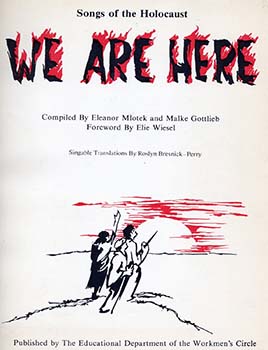Written in the Vilno ghetto, the song became the anthem of the underground resistance movement. Later it spread to other ghettos and partisan divisions. Today it is sung at all commemorative gatherings. It was written by Hirsh Glik (see note about author in Shtil Di Nakht). He set the words to a melody by the Russian composer Dmitri Pokrass. It is also known as Partizaner Himen (Partisan Song).

Never say this is the final road for you,
Though leadened skies may cover over days of blue.
As the hour that we longed for is so near,
Our step beats out the message — we are here!
From lands so green with palms to lands all white with snow.
We shall be coming with our anguish and our woe,
And where a spurt of our blood fell on the earth,
There our courage and our spirit have rebirth.
The early morning sun will brighten our day,
And yesterday with our foe will fade away.
But if the sun delays and in the east remains
This song as password generations must maintain.
This song was written with our blood and not with lead,
It’s not a little tune that birds sing overhead,
This song a people sang amid collapsing walls.
With grenades in hands they heeded to the call.
Therefore never say the road now ends for you,
Though leadened skies may cover over days of blue.
As the hour that we longed for is so near
Our step beats out the message– we are here!
Zog nit keyn mol az du geyst dem letstn veg,
Khotsh himlen blayene farshteln bloye teg.
Kumen vet nokh undzer oysgebenkte sho
Es vet a poyk ton undzer trot — mir zaynen do!
Fun grinem palmenland biz vaysn land fun shney,
Mir kumen on mit undzer payn, mit undzer vey,
Un vu gefaln s’iz a shprits fun undzer blut,
Shprotsn vet dort undzer gvure, undzer mut.
Es vet di morgnzun bagildn undz dem haynt,
Un der nekhtn vet farshvindn mitn faynd,
Nor oyb farzamen vet di zun in dem kayor —
Vi a parol zoI geyn dos lid fun dor tsu dor.
Dos lid geshrihn iz mit blut un nit mit blay,
S’iz nit keyn lidl fun a foygl af der fray,
Dos hot a folk tsvishn falndike vent
Dos lid gezungen mit naganes in di hent!
To zog nit keyn mol az du geyst dem letstn veg,
Khotsh himlen blayene farshteln bloye teg,
Kumen vet nokh undzer oysgebenkte sho —
Es vet a poyk ton undzer trot — mir zaynen do!
זאָג ניט קײן מאָל, אַז דו גײסט דעם לעצטן װעג,
כאָטש הימלען בלײַענע פֿאַרשטעלן בלױע טעג.
קומען װעט נאָך אונדזער אױסגעבענקטע שעה,
עס װעט אַ פּױק טאָן אונדזער טראָט — מיר זײַנען דאָ!
פֿון גרינעם פּאַלמענלאַנד ביז װײַסן לאַנד פֿון שנײ,
מיר קומען אָן מיט אונדזער פּײַן, מיט אונדזער װײ,
און װוּ געפֿאַלן ס׳איז אַ שפּריץ פֿון אונדזער בלוט,
שפּראָצן װעט דאָרט אונדזער גבֿורה, אונדזער מוט.
עס װעט די מאָרגנזון באַגילדן אונדז דעם הײַנט,
און דער נעכטן װעט פֿאַרשװינדן מיטן פֿײַנד.
נאָר אױב פֿאַרזאַמען װעט די זון אין דעם קאַיאָר —
װי אַ פּאַראָל זאָל גײן דאָס ליד פֿון דור צו דור.
דאָס ליד געשריבן איז מיט בלוט און ניט מיט בלײַ,
ס׳איז ניט קײן לידל פֿון אַ פֿױגל אױף דער פֿרײַ,
דאָס האָט אַ פֿאָלק צװישן פֿאַלנדיקע װענט
דאָס ליד געזונגען מיט נאַגאַנעס אין די הענט.
טאָ זאָג ניט קײן מאָל, אַז דו גײסט דעם לעצטן װעג,
כאָטש הימלען בלײַענע פֿאַרשטעלן בלױע טעג.
קומען װעט נאָך אונדזער אױסגעבענקטע שעה —
עס װעט אַ פּױק טאָן אונדזער טראָט — מיר זײַנען דאָ!
Song Title: Zog Nit Keyn Mol

Compiled by sisters Malke Gottleib and Chana Mlotek, this collection of 40 songs, issued on the occasion of the 40th anniversary of the Warsaw Ghetto Uprising, reflects the suffering, despair, longing, as well as the strength, hope and courage that led the last remnant of enfeebled Jews to take up arms against the mammoth Nazi war-machine. Save for five songs, this compilation comprises songs that were actually written or sung in the ghettos and concentration camps. Four exceptions written after the war: “Babi Yar,” “Moyshelekh un Shloymelekh,” “Kadish,” and “Mayn mame hot gevolt zayn oyf mayn khasene” are often presented at commemorative gatherings and were therefore included. The fifth song “Am Yisroel Khay” was written in a D.P. camp and is an affirmation of the will of the survivors to build new lives for themselves, holding high their belief in the endurance of the Jewish people. To enable readers and singers not conversant with the Yiddish alphabet to utilize this collection, We Are Here! Songs of the Holocaust provides parallel transliterations and singable English translations by Roslyn Bresnick Perry.